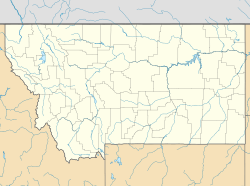Anna Scherlie Homestead Shack facts for kids
Quick facts for kids |
|
|
Anna Scherlie Homestead Shack
|
|
| Location | Montana Highway 241, south of the Canada–US border, near Turner, Montana |
|---|---|
| Area | 1.9 acres (0.77 ha) |
| Built | 1913 |
| Architectural style | Prairie Homestead |
| NRHP reference No. | 98001338 |
| Added to NRHP | November 5, 1998 |
The Anna Scherlie Homestead Shack is a special historical place in Turner, Montana, United States. It was added to the National Register of Historic Places on November 5, 1998. This small building tells the story of Anna Scherlie, a brave woman who settled here over 100 years ago, showing how people lived and worked on the American frontier.
Contents
The Homestead Story
What is a Homestead?
A homestead was a piece of land given to settlers by the United States government. People could claim this land if they promised to live on it and improve it. The idea was to encourage people to move west and farm the land.
The Enlarged Homestead Act of 1909 made it easier for people to claim land. It allowed settlers to claim more land than before. This act brought many new families to places like Montana.
Anna Scherlie's Journey
Anna Scherlie was one of these settlers. She was 32 years old when she arrived in Montana in 1913. She came to an area known as the "Big Flat." Her brother, Neil J. Scherlie, had already claimed land nearby. Over time, three of her sisters and two more brothers also settled close by.
Anna was part of a long history of women who became homesteaders in Montana. In some areas, about one-fourth of all homestead applicants were women. This shows how important women were in settling the American West.
Life on the Homestead
By 1916, Anna had planted 40 acres of her land. She grew important crops like wheat, oats, and flax. Life on the Big Flat was often lonely because farms were far apart. Many settlers would leave during the cold winters. Anna also followed this practice.
It is said that Anna would go to St. Paul, Minnesota, during the winters. She reportedly worked for the family of James J. Hill, a very important railroad owner. This helped her earn money and escape the harsh Montana winters.
Anna's Simple Home
Anna's home was a small wooden shack. It measured about 14.5 feet by 14.5 feet and had a sloped roof. She made very few changes to her home over the years. She added a small entrance area, called a vestibule, which she used as a summer kitchen. She also added a storage shed and a laundry area.
Anna lived through many big events, including droughts, the Great Depression, and two world wars. Even as her neighbors built more modern homes, Anna preferred her simple shack. She would often say she was "too old for modern conveniences." It seems she simply liked a simple way of life.
A Lasting Legacy
When Anna passed away in 1973, she left behind a large amount of money. It was divided among her eighteen nieces and nephews. Her ashes were scattered under a lilac bush on her property.
In 1968, Leon and Nellie Cederburg bought the homestead. Anna had moved to Havre by then. The Cederburgs decided not to turn the land back into a farm. Instead, they chose to keep Anna's homestead exactly as she left it. This helps us remember Anna Scherlie and the history of homesteading in Montana.



